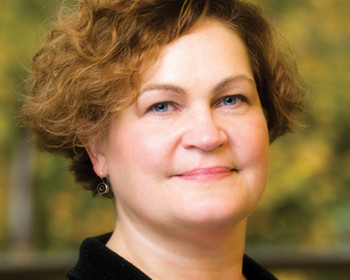Tyson Smith ’03
Open gallery

Smith earned a BS magna cum laude in civil and environmental engineering from Vanderbilt University and an MS in civil and environmental engineering from Stanford University. Following law school, he worked as an attorney for the Nuclear Regulatory Commission before joining Winston & Strawn LLP, where he continues to work as a partner on nuclear facility licensing and regulation, investigations, and litigation.
How did you get into energy law?
As an undergraduate, I had a scholarship funded by the U.S. Department of Energy that required me to take courses in nuclear physics, nuclear engineering, and similar subjects. Then, after Stanford, I took a job with the U.S. Geological Survey researching low-level radioactive waste disposal. So, I’ve been involved with nuclear energy in some form since college.
It was always my plan to be a lawyer. While science and engineering have always fascinated me and I really enjoyed the technical work, I also had a strong interest in overarching policy issues, such as climate change. I seemed to have a knack for translating technical concepts into policy and vice versa. A law degree seemed like the logical next step. Lawyers can play a key role at that intersection between science and law, and that’s what I wanted to do.
Based on your experience as a lawyer, do you think policymakers care about the technical issues?
Yes, but perhaps not about the details as much in every case. It’s the same on the other side, though—technical people want details, but they don’t always do well translating that information into action. That’s an important role for lawyers.
What did you do at the Nuclear Regulatory Commission (NRC)?
I was an honor law graduate in the Office of the General Counsel, where I worked a series of rotations. One involved nuclear power plant licensing and relicensing, another was with the high-level waste division, a third dealt with investigations and enforcement, and the last was rulemaking. It was a fantastic opportunity to learn about the various responsibilities of the NRC, as well as how administrative agencies function more generally.
To realistically shift our energy production to low- carbon sources in time to avoid a significant increase in global temperatures would require a serious commitment to expanding nuclear in the United States and abroad—solar and wind simply are not enough.Tyson Smith ’03
What was your favorite detail?
I enjoyed working on Yucca Mountain, because it was technically engaging, complex, and high profile, but then the U.S. Department of Energy withdrew the application to build a repository there. Congress, the administration, and the courts are still grappling with those issues. I also liked new reactor licensing, and was fortunate enough to work on the first applications for new reactors since the late 1970s.
What do you do now?
I work on licensing for reactors and fuel cycle facilities, energy-related litigation, and investigation and enforcement. I also do some international work on nuclear liability and export controls. In fact, I just completed a short book about nuclear energy regulation in India.
What do you think of the policy and economic framework for nuclear energy?
Nuclear power plants are facing challenging economic conditions around the country. The market failures creating these conditions are caused, in many cases, by policies that promote and subsidize renewables, such as production tax credits and renewable portfolio standards. Perversely, these policies are also threatening the long-term viability of the largest sources of carbon-free power in the United States—nuclear energy. This is why a number of states are now taking steps to ensure that these market failures are addressed. But, there remains a need for state and national action to address the market failures more broadly. For example, states should have low-carbon energy standards, which would better recognize the benefits of nuclear energy, rather than renewable energy standards. At the national level, efforts like the Clean Power Plan represent some initial steps towards appropriately accounting for low carbon generation. But more could and should be done.
What is your prognostication for nuclear power?
In the United States, nuclear generates approximately 20 percent of electricity and will continue to be a major contributor to our energy mix for the foreseeable future. We will probably see a slow decline of nuclear generation over the next several years, even with the new reactors now under construction scheduled to come online. But new technologies should result in growth for nuclear power over the next decade or so. Globally, the market for nuclear generation is and will continue to be much more robust. For example, China and India are implementing ambitious plans for their nuclear power growth.
What about waste disposal?
This is a political issue, not a technical or safety one. After a lengthy review of potential sites for a national nuclear waste repository, Congress voted nearly unanimously to locate such a repository at Yucca Mountain, Nevada. The Department of Energy subsequently submitted an application to the NRC, but has yet to follow through with the project due to a lack of funds from Congress. While project opponents have argued that Yucca Mountain is “not safe,” the fact is that the NRC, which is the expert independent agency charged with ensuring radiological health and safety, has found that the project meets all regulatory requirements and has minimal environmental impact for at least one million years. That is a long time, especially when you consider the real and imminent threat of climate change to this and future generations.
You are pretty optimistic about nuclear energy’s future. Do you generally feel positive about climate change solutions?
Unfortunately, no. We already have the technology needed to address climate change, but we lack the political will to deploy this solution at the scale or in the time frame necessary. To realistically shift our energy production to low-carbon sources in time to avoid a significant increase in global temperatures would require a serious commitment to expanding nuclear in the United States and abroad—solar and wind simply are not enough. Yet, we seem to be moving in the opposition direction. A different mindset is needed. If people are serious about working to mitigate global warming, they should support nuclear as part of the mix of low-carbon energy sources going forward.
What advice would you give to students interested in energy law?
It’s important to pick a niche of interest to you and develop a specialty. (This is particularly true in the nuclear energy field.) But cultivating your expertise makes the job fun. You can become a thought leader, and this both gives you purpose and makes you valuable to your clients. If you’re deeply interested in something, you tend to be better at it and you will be more satisfied.
More Advocate Magazine Stories
email jasbury@lclark.edu
voice 503-768-6605
Judy Asbury, Assistant Dean, Communications and External Relations
Advocate Magazine
Lewis & Clark Law School
10101 S. Terwilliger Boulevard MSC 51
Portland OR 97219

